Suchona Shely : A modern Baul who speaks of harmony
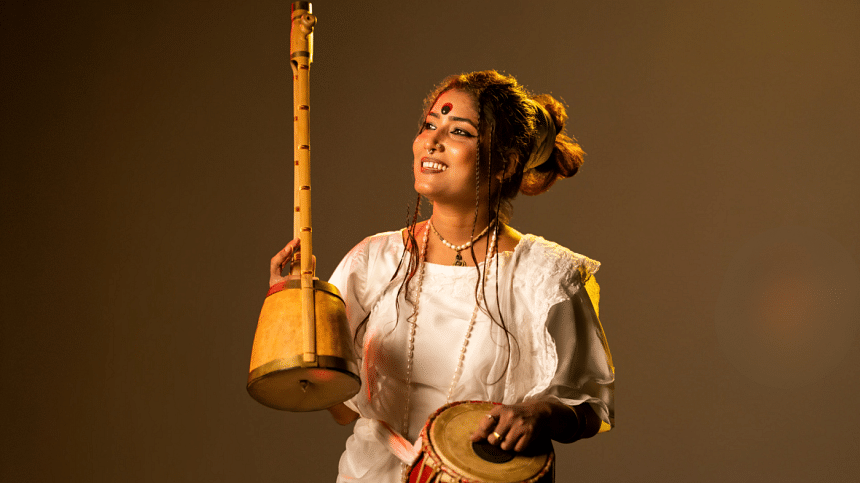
When will the day come when Hindus, Muslims, Buddhists, and Christians
no longer cling to caste or creed?
When will such a human society be born—
a world free from division and prejudice? – Lalon
Draped in a simple white saree—an emblem of spiritual purity—Suchona Shely stood in quiet devotion within the studio, her two companions by her side: the ektara and duggi. The saree, unadorned yet luminous, reflected the inner simplicity of Baul life—a life stripped of ego, bound not by ritual but by love for the Divine within.
As Shely began to sing "Emon Manush Shomaj", a timeless Lalon geeti, her fingers gently awakened the ektara's string, while the heartbeat of the duggi echoed the yearning in her voice. It was not merely a song—it was a prayer. A cry for unity, for boundless love, for a world freed from the chains of creed, caste, and division.
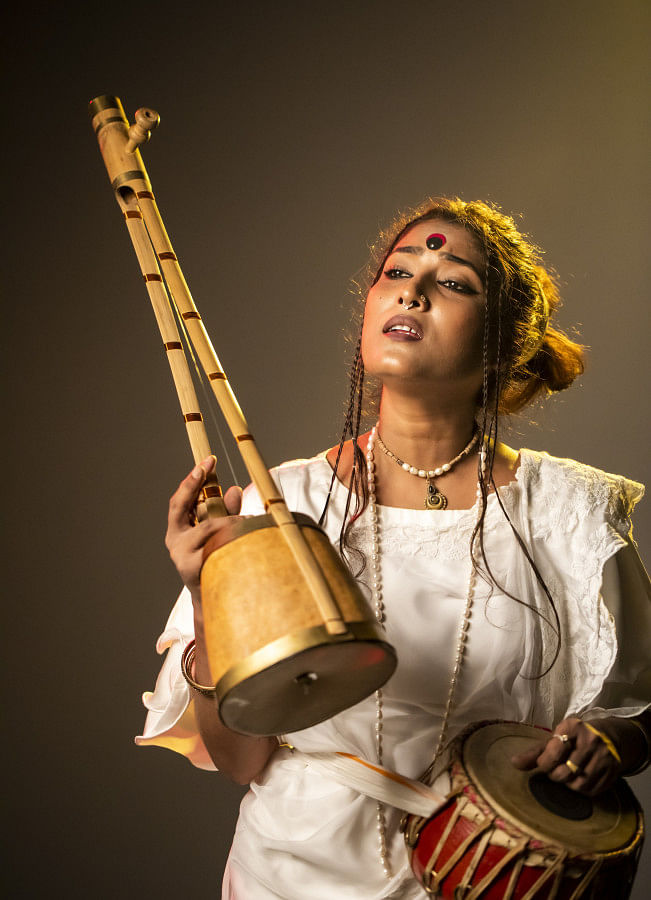
For Shely, a devoted Baul singer from the village of Lakshmipur, music is not performance—it is prayer. Her father, Abdul Jolil Sordar, a Sadhu, always hoped that one of his daughters would become a Sadhu. Shely answered that call. At the tender age of six, she renounced meat—and even eggs—embracing a life guided by the Baul ideals of detachment, purity, and love for the Divine within.
"Living this way wasn't easy at first," Shely recalls. "I don't even eat food prepared in utensils used for meat or eggs. People thought I must be Hindu because of that. It caused a lot of misunderstanding in the beginning."
But over time, something changed. Her quiet consistency began to speak louder than the assumptions. "My village saw how I lived—with peace and simplicity. And slowly, their attitudes shifted," she reflects. "Now, they see things differently."
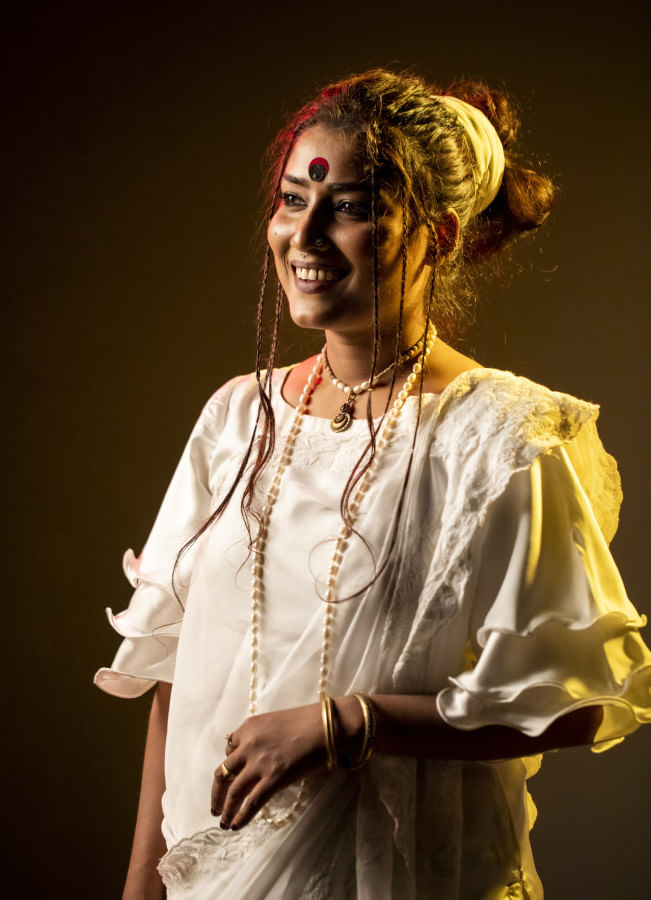
Today, the people of Lakshmipur, refer to Shely's home as an ashram—a sanctuary of spirit. "Each year, on December 15, we host a Sadhu Songo—a gathering of sadhus and seekers," she shares. Yet Lakshmipur, was not always a place for spiritual music. "There was no tradition of song here. But now they would always ask me 6 months prior to the event when it will start as those are the times that they get to see so many sadhus at the same time," she says. "My ashram stands right beside a mosque—literally side by side. In today's Bangladesh, music near mosques is often seen as unimaginable, even forbidden. But I am deeply grateful that such conflict does not live here."
"Lalon Shah spoke the language of truth," Shely continued. "If someone can present that truth properly—and if I can help people understand that divinity resides in melody—then that's what truly matters. If we can express this with love, I believe there's no room left for conflict."
And yet, despite her growing recognition, Shely resists being called a 'shilpi' (artist). "If you listen to Lalon's song "Shotto Bol, Shupothe Chol" and truly understand just those lines—then you need nothing else," she says. "No rituals. No practices. Just the essence. Today, we often dress up songs with visuals and movements, but true music must be felt from within."
"Lalon Shah's words are not just lyrics—for me they are the truth. How can we turn truth into a spectacle? I don't wish to be a guru. I don't even wish to be a shilpi. I only want to be a servant—an eternal devotee of the Sadhu guru. That is enough for me."
All through her childhood, she explored every instrument she could find: the harmonium, mondira, ektara, duggi, dotara. "I tried them all," she says. "I've always been a devotee of Lalon sai. And to truly carry his message, one must connect with his roots—through his instruments".
For Shely, the ektara and duggi are not just tools of rhythm—they are vessels of transmission. "These are the sounds that carried Lalon's words through the wind, from one seeker to another," she reflects. "Even today, you'll find many male sadhu-fakirs playing them. But for artistes of my generation, especially women, singing with just the ektara and duggi seems almost unimaginable."
Beyond live performances, Suchona Shely has lent her voice to films in both Bangladesh and Kolkata, and appeared in Coke Studio with Fuad for the track "Dewana".
"My first song with SVF was a fusion of Rabindranath Tagore and Lalon Shah's words," she recalls. "Later, they invited me to sing a Rabindra Sangeet despite being a lalon singer. They felt I was the right choice for "Tumi Khushi Thako", and the audience loved it."
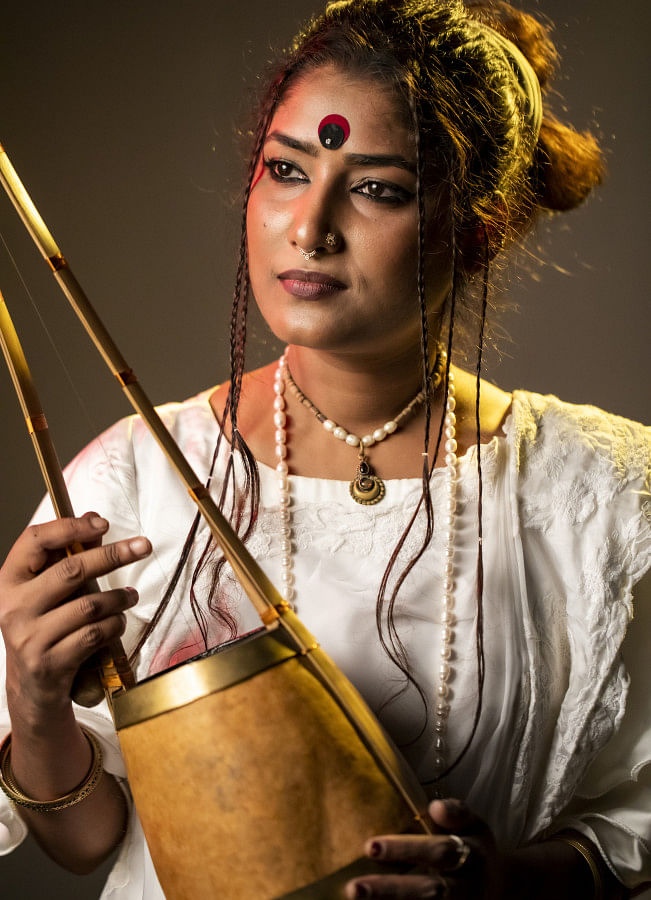
Reflecting on her Coke Studio experience, she recalls, "For 'Dewana', it was Arnob da who insisted I join. He was familiar with my work and felt I needed to be part of the song."
Shely has also lent her voice in Aranyo Anawer's film 'Maa' and contributed two songs to 'Nakshi Kanthar Jamin'.
While Baul sangeet still resonates across the rural heartlands, its essence seems to be slipping from the grasp of the younger generation.
"My father first introduced me to Lalon Sai's teachings—he was a follower himself," Shely shares. "But today, many young people don't even speak Bangla fluently. To them, I would say: listen to Bangla, love the language, and learn it with your heart. Without that, it becomes almost impossible to truly understand Baul philosophy. Baul songs are woven in Shadhu bhasha. It demands not just education, but deep intellectual and spiritual insight."
"There must be more research on Baul sangeet. Scholars, thinkers—our brightest minds—should write about Lalon sai in ways that touch both the mind and the soul. We need a book, a path, a subject that brings Lalon's message to every doorstep," added the singer.
"Let 100 sadhus speak—not of dogma, but of love. Let their words be heard across the world, in a time when hatred and division tear us apart. This war—between Hindu, Muslim, Buddhist—it is heartbreaking. Despite all these labels, the greatest religion is humanity. And until we live by that, we remain strangers to ourselves," stated Shely.

 For all latest news, follow The Daily Star's Google News channel.
For all latest news, follow The Daily Star's Google News channel. 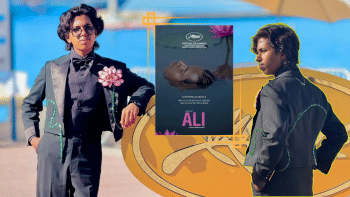




Comments